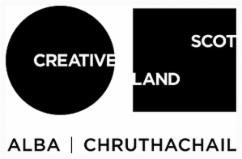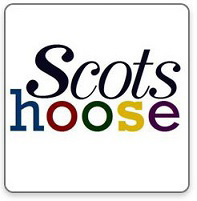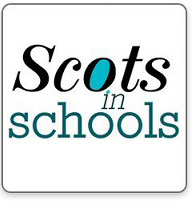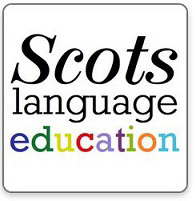Scots Hoose is an online education resource dedicatit tae supportin creativity in the Scots language. Skoosh is an online publication that celebrates new Scots writing by young people. Scots scriever Matthew Fitt is the director o Scots Hoose and editor o Skoosh.
Tae contact Scots Hoose or submit new Scots writing for Skoosh, e-mail matthew@scotshoose.com
Scots Hoose is committit tae the belief that increasin Scots language provision in education can help close the attainment gap and improve the life chances o mony o oor young Scots speakers.
Through its Open Funding programme, Creative Scotland supportit a series o Scots Hoose creative writing workshops in five Scottish secondary schools in academic year 2016/17. Matthew Fitt led workshops wi pupils and dominies in Kirkcaldy High School, Banff Academy, Ayr Academy, Bellshill Academy and Baldragon Academy, Dundee. National Scots Scriever Hamish MacDonald kindly gied his time tae visit aw five schules inspirin mair weans tae scrieve in Scots.
Muckle thanks gae tae the dominies in each o the schules wha supportit the Scots Hoose ootreach programme: Kirsten Hume, Jane Bell, Derek Allan at Kirkcaldy High School; Dr Jamie Fairbairn and Rachel Anderson at Banff Academy; Karen Johnston and Hollie Aitken at Ayr Academy; Alastair Scott, David Alexander, Janice Casement and Lorna Boyd at Bellshill Academy; and Derek Wagner at Baldragon Academy.
Wioot their commitment and support for Scots Hoose, the contents o Skoosh micht hae been awfie puir-lookin and shilpit.
But Skoosh is gey prood tae publish this rich and gowden hairst o poetry, prose and drama by pupils fae across Scotland.
Ower 90 pieces o creative writing in 7 different dialects o the Scots leid by young folk aged 10 tae 18 demonstrates lood and clear the love that exists in Scotland's communities for oor Mither Tongue and the important role that Scots has tae play in terms o literacy, creativity and identity in Scottish education.
Throughoot the year, ither schules jined in this celebration and thanks are due tae Jean Wilson at Buckie High School, Rosemary Daley and Isla Wilson at Keith Grammar School, Jacky Davidson at Forres Academy, Laura Barbour at Dunfermline High School, Tracey McDougall at Balcurvie Primary School in Fife and Simon McMahon at St Andrew's Primary School in Dundee.
And Scots Hoose wid like tae thank aw the bairns and young folk that worked sae hard and scrievit sic braw brilliant creative writing in Scots. Weel done the lot o yis!
Tellin young Scots speakers their language is worthless risks cowpin and smoorin their confidence. Giein young Scots speakers opportunities tae explore their ain language can result in confident expressive writing like the poems and stories published here on Skoosh.
But the last word maun go tae ane o this new generation o young adults that's prood tae baith speak and scrieve in Scots, a Banff loon wi questions tae spier aboot his first language and its place in modern Scotland...
| | And fit why kin I nae spik the Mither Tongue? by Robert Legge Huge debate over wither or nae this is an actual language, I hiv honestly niver heard onything like it. Fowk fae France spik French, just like Fowk fae England spik English, so fit why kin those fae Scotland nae spik Scottish? Jist tae get things off on the richt fit, Scots and Doric are nae the same thing. Scots is the general term for a these fowk aroon Scotland spikin the broad language, bit Doric is key ti the North East o Scotland. This is the case in muny oh the toons far and wide aroon the world, different areas spik in different ways. I attended a Scots language event last wik at Aiberdeen University and I was pleasantly surprised by the sheer amount o fowk that believe in the Mither Tongue. Muny comin fae far and wide to express their ain views on the term “Scots Language” which yes, is a Language. Some wir Doctors, some professors even a puckle oh lawyers turnt up tae mak sure that fowk realise how important it is tae us in this area. Okay aye, yi maybe widna hear number 1 in the charts sittin wee a doric folk singer, but fit why nae? I'll tell yi why, because fowk are sheep. Ah oh us are far too stuck on the English language which muny oh us would call a “real” way o spikin. Fan I’m sittin tae a nice warm cuppychar sloupit ower the en oh the sofa, am nae needin tae hear that its gan ti be “torrential rain in the morning and showers shall spread across the north east into the evening”, am needin ti hear that its gan ti be “dingin doon ower at Bunff and the sun’s gan ti be richt haet in Portsoy”. As a young loon I aye spoke doric. Granny and granda were broad spikkers and mither and faether used doric ana. Although, a prime example o the language changing ower the space o 20 miles wis my granny and granda originally comin fae Fochabers and mither and faether comin fae Keith. Quite often I wid find myself struggling tae understand the wurds my grunny wid use, but it wis ah Scots. The importance o the language is huge, it lets us express oorselves much mair than standard English, it lets us spik ower social media and in public in a different way than abdy else, bit yet again it's frowned upon. Schools are slowly startin ti decide that Scots can now become a recognised qualification, which is great, but it's taen its time ti brak throw. If we keep gan the way that it is, muny good things could come oot oh the new recognition its gettin. As lang as we are nae feert ti use it oot in public and keep pushin for oor language ti be spoken! |



